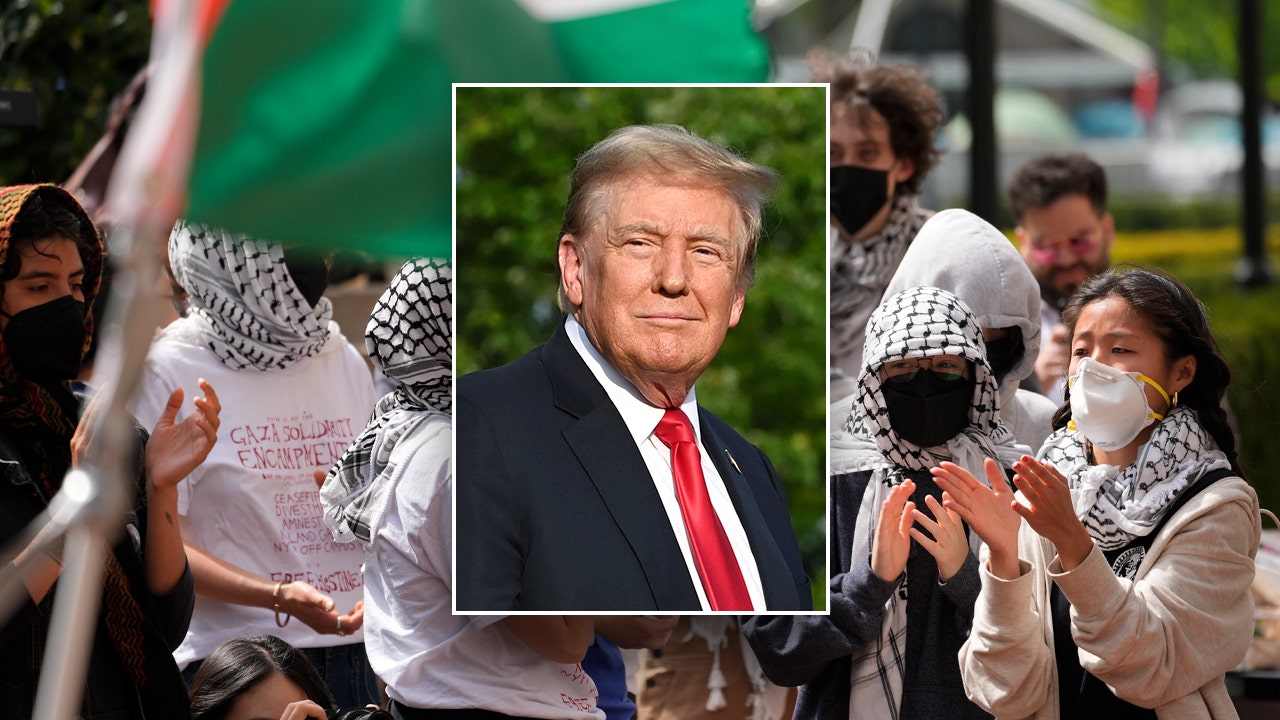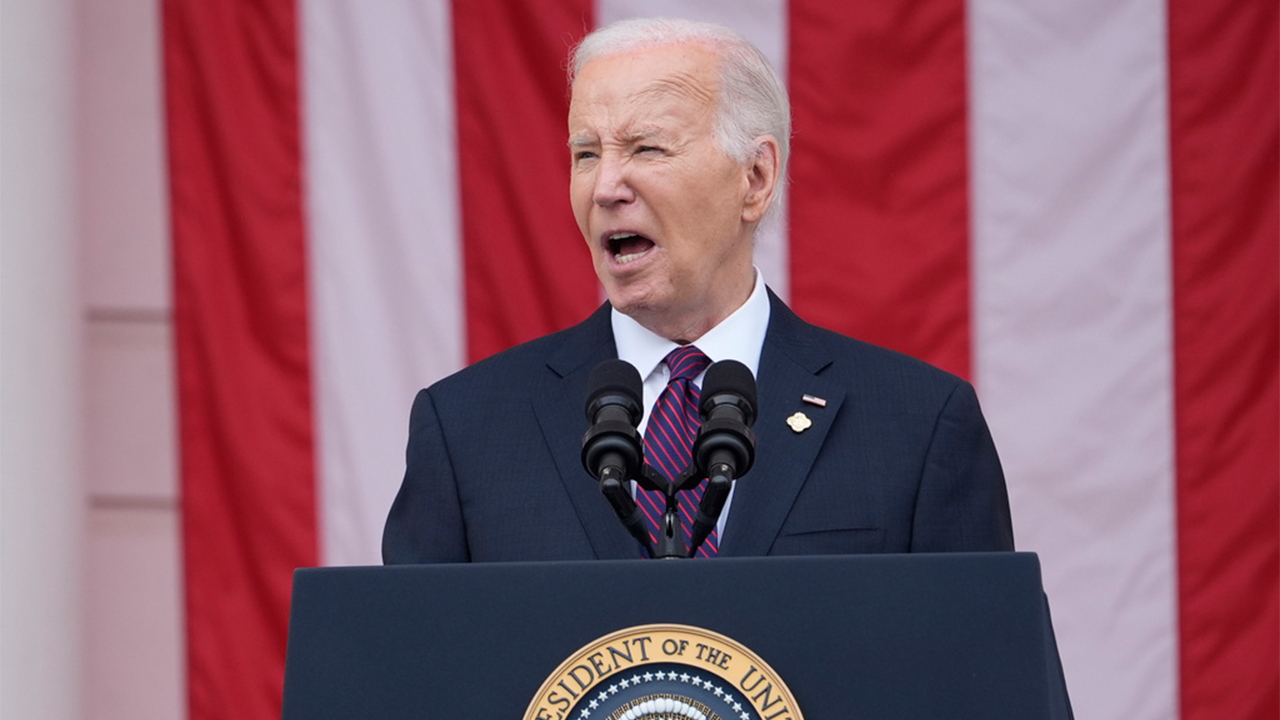World
Pro-Palestine protests: How some universities reached deals with students

EXPLAINER
Many campus protesters have taken down Gaza solidarity encampments after colleges agreed to consider divestment from Israel.
College campuses around the world have exploded in recent weeks in protests by pro-Palestinian students and faculty members against Israel’s war on Gaza, in which more than 34,000 people have been killed.
In university after university, protesters are demanding that their schools sever any direct or indirect financial and academic links with Israel, including by divesting from companies with ties to Israel.
The protests have led to an array of different responses from universities. On Monday, Columbia University cancelled its main graduation or commencement ceremony. Many universities have called police and other law enforcement agencies on to campus. In the United States alone, more than 2,000 students have been arrested. Both protests and the campus crackdowns have also spread to other parts of the world – from Canada to Australia, and in multiple European nations. On Monday, students at Oxford and Cambridge in the United Kingdom also set up encampments.
Yet, even as tension continues to soar at several campuses, students and administrators in some universities have managed to negotiate agreements that have acceded to some of the demands of the protesters.
So how have these universities managed protests – and what deals have students and administrators struck in these cases?
What are the compromises universities and protesters have struck?
For the most part, the agreements that have helped calm tensions have revolved around a few common themes:
- Some universities have agreed to divest from companies with links to Israel, while others have said that they will consider the demands and take them up with bodies in charge of overseeing their investments. In some cases, universities have agreed to demands to disclose their investments, without committing to divest.
- Other universities, including some that have also conceded ground on divestment-related demands, have agreed to invest in setting up new centres or hiring new faculty in a bid to create greater awareness about Palestine.
- In exchange, students on these campuses have agreed to end their encampments.
- In some cases, universities have chosen to take no action to disperse encampments, allowing them to continue. These include Wesleyan University in Connecticut and the University of California, Berkeley.
Which universities have agreed to specific student demands?
- Northwestern University, based in Illinois, US struck a deal with its protesting students on April 29 to take down most of the tents. It allowed them, however, to continue their protest – just not through an encampment – until June 1. The university promised to provide students with ways to engage with the Investment Committee of the Board of Trustees, including re-establishing an advisory committee on investment responsibility in the fall (autumn). The advisory committee could consider divestment proposals from university members. The institute agreed to disclose its investments through its endowment funds to “internal stakeholders”, which include current students, faculty, staff and trustees. Northwestern also agreed to cover education at the university for five Palestinian undergraduate students.
- Brown University in Rhode Island agreed on April 30 that the Corporation, Brown’s highest governing body, would vote on divestment from companies affiliated with Israel during a meeting in October. In return, students cleared the encampments that had been in place since April 24.
- Also on April 30, students and administrators at Evergreen State College in Washington agreed to a pact. Students removed a week-long encampment. The university set up task forces to assess – among other things – investment policies and the possibility of divestment, and look at whether the school’s policies regarding grants help governments engaged in illegal occupations abroad.
- On May 1, the University of Minnesota announced a compromise under which it promised to provide protesters with information on public companies it has invested in. However, the university made it clear that non-disclosure agreements barred it from disclosing information about private companies that the school has invested in. It added that the administration had recommended to the University’s police department that it avoid arresting student protesters. However, the university said it will not ban employers from career fairs because it does not “support restricting student career opportunities”. Students had been demanding that firms with ties to Israel not be invited.
- Student protesters from Rutgers University in New Jersey reached an agreement with the administration on May 2. The university agreed to create an Arab cultural centre and hire staff and instructors who have knowledge about Palestinian communities alongside naming Palestine, Palestinians and Gaza in future communications. It also agreed to work with students, faculty and staff to support 10 displaced Palestinian students to complete their education at Rutgers. No students, staff or faculty involved in the encampment will face retaliation, the university promised. The students’ request for divestment is also under review.
- Goldsmiths University in the UK reached an agreement on May 3 after students set up encampments in the university’s library. Goldsmiths agreed to a new ethical investment policy. The protesting student group will have an opportunity to present their “evidence of Goldsmiths’ complicity with Israel” to the institute’s finance committee. Goldsmiths also agreed to name one of the media department’s lecture theatres after Shireen Abu Akleh, an Al Jazeera reporter who was killed by Israeli forces while she was on assignment in the West Bank. The institute will also conduct a review of the International Holocaust Remembrance Alliance (IHRA) definition of anti-Semitism which critics have described as so broad as to effectively bar most criticism of Israel.
- The University of California, Riverside (UCR) issued a statement on May 3 saying an agreement has been reached to peacefully end the encampments. The university announced it would publish several details of its investments online. UCR’s School of Business has also discontinued multiple global programmes, including those in Israel. Students also want the university to ban the sale of Sabra Hummus, a packaged hummus brand owned by PepsiCo and the Israel-based Strauss Group, from campus. The university said it would review the demand.
- Thompson Rivers University (TRU) in Canada’s British Columbia also saw an agreement on Saturday, May 4, following negotiations, making it the first Canadian institute to see a deal. TRU’s student group called the People’s University of Gaza at TRU did not have encampments and began their push towards divestment through an email sent to the administration on April 30, a TRU student protester wrote in a statement to Al Jazeera. The TRU administration has agreed to disclose their investments within 30 days of the students filing a Freedom of Information (FOI) request. A student at TRU told Al Jazeera that they have already filed the request. Once TRU discloses its investments, students will draft a divestment proposal. However, TRU has refused to publicly condemn and demand an end to “acts of genocide in Gaza,” which was one of the students’ demands. “We will continue to engage with the institution on this matter,” a press release by the People’s University of Gaza at TRU said.
What’s happening on other campuses?
Columbia announced on Monday that there will be smaller, school-level ceremonies during this week and the next, instead of a large commencement.
Also on Monday, pro-Palestine student protesters at the Massachusetts Institute of Technology (MIT) resisted a university deadline to clear the encampment. This was after the institute’s president issued a warning letter to students where he asserted they would be suspended if they did not disperse voluntarily. Harvard authorities issued a similar letter to students on Monday, saying that the students who continue with the encampment “will be referred for involuntary leave from their Schools”.
Students at more than 100 universities are protesting across the US. Their counterparts in at least 20 campuses outside of the US are protesting and several of these protests are also encampments.
What are the reactions to the encampment deals?
While some students and those supporting them have welcomed the breakthroughs with university officials, others have criticised the deals as inadequate. Northwestern University is a case in point.
Immediately after the deal, two Palestinian students at the university said they were proud to “have a seat at a table that we’ve never had before,” student-run newspaper The Daily Northwestern reported. Similarly, the student protesters at Brown celebrated the deal after the encampment was dismantled.
Here is another idea #ColumbiaUniversity, instead of turning your campus into a police state https://t.co/AIBV4N0dZ5
— Matteo Farinella (@matteofarinella) May 1, 2024
However, not everyone has hailed the deals as a win.
this is NOT good. The divestment is NON BINDING and the vote won’t happen until OCTOBER. Administration win for this https://t.co/ty2OGN2WwM
— lucas 📕 (@lucas_s21122) May 1, 2024
The Daily Northwestern reported that some students were disappointed that the deal did not involve divestment.
On the other hand, critics of the pro-Palestine protests have also accused the universities of buckling under pressure in reaching the agreements.
Not only is it a major cave, it’s also got major anti-Semitic implications
Dude weird it’s like the “until our demands are met” Rutgers protester-agitator branch planned it that way https://t.co/7n3HuNXNbu
— AAPL Tree (@AAPLTree) May 3, 2024
On May 1, two graduate students and one first-year undergraduate student at Northwestern University sued the institute in a breach of contract lawsuit, saying that the university breached its own rules by allowing the encampments. The lawsuit also criticised the agreement for allowing student protesters to stay on campus until June 1.

World
Why the Biggest Tech Companies Are Suddenly Streaming Sports

When it comes to streaming, sports had to play catchup. In the mid-2010s, as the world grew comfortable with digital entertainment services, major leagues largely remained on the sidelines. Companies like Netflix focused on binge-able shows over live entertainment and streamers balked at the regional restrictions or high costs that came with acquiring athletic events. Leagues, meanwhile, valued the consistent reach traditional TV provided—and the big paychecks, too.
“I’m very confident we can get twice as big as we are without sports,” Netflix CEO Ted Sarandos said at the end of 2022. Well, this month Netflix announced a deal to stream two NFL games on Christmas Day next season, at a reported total cost of roughly $150 million. For those counting at home, the company’s market cap and subscriber count are each up more like 10% rather than 100% since Sarandos’ prediction.
And it’s not just Netflix getting involved. Apple committed to a 10-year partnership with Major League Soccer. Google is now spending $2 billion annually for NFL Sunday Ticket rights. Amazon seems, dare I say, primed to add NBA inventory to its NFL slate and other sports rights. Even Roku recently joined the party. If Microsoft launched a Windows streaming service anchored by live sports, we’d have no right to be surprised.
So what happened? It’s a question I’ve been asking in various forms to both sports and tech decision-makers for the last several years. As expected, there’s no single explanation for big tech’s big surge into the sports viewing experience. But the following four reasons are all regularly citied.
The tech works
This was always going to be the first hurdle. And live sports went through its growing pains, with broken payment processes holding viewers up as well as glitches emerging during crunch time of the Super Bowl. Netflix’s early live streaming attempts came with their own set of issues.
In 2024 though, the tech’s solid. Sure, there are areas for improvement, such as cutting down the delay between reality and the broadcast (latency) or upping the picture quality. Accessibility is also an issue for those without reliable, high-speed internet. But in each case, we’ve passed the point of “good enough.”
Sports are multi-generational
For a time, streamers specialized: There was your horror movie service, your classics subscription, your kids-focused offering and so on. But now, the heavy hitters try to appeal to a wide swath of potential viewers, and sports hit multiple demographic segments like few other properties. That’s especially true as blockbuster movies have become much less of a sure thing. The $75 million price tag Netflix is paying per NFL game is roughly equivalent to the cost of a single midsized movie on the service. Christmas flick out, Patrick Mahomes in.
By the same token, sports fans are generally followers for life. While people often cycle through their preferred type of TV show, athletic allegiances stick around. As streamers put an emphasis on retaining their current customers, that type of loyalty is invaluable.
Sports = ads
Today’s consumer has gotten used to ad-free, or at the very least ad-light, entertainment experiences. That is, except for sports fans. While the NFL has worked to lighten ad loads during games, commercials are still a natural part of broadcasts. Sports also offer advertisers a reliable audience watching brand-safe content, regardless of what platform games air on. And tech companies are increasingly in the ad business.
Amazon turned its Black Friday NFL game into an ad tech showcase. Netflix’s push into live entertainment has uncoincidentally followed the addition of an ad-supported pricing tier. Even Apple is reportedly attempting to grow its ad business, backed in part by sports assets.
At Netflix’s pitch to advertisers in NYC earlier this month, sports partners like Formula 1 and WWE received the largest footprint in the company’s warehouse-turned-“immersive experience.” That wasn’t a coincidence.
Eyes around the world
For a while, sports leagues selling games to streamers was seen as taking extra money at the expense of reaching fewer fans. But now, global tech brands can offer something that some traditional providers can’t match.
Amazon has helped the NFL reach new, younger fans with its shows, while Netflix will now make football easier to watch for many international fans. “It’s a global opportunity for us,” NFL media COO Hans Schroeder recently explained. I expect that the game times—1 and 4:30 pm ET rather than primetime—were in part set to increase viewership in Europe and beyond.
Tech companies have also wooed leagues with the precise data they’re able to gather on viewers and potential viewers, valuable information for sports executives building out international marketing strategies.
Put it all together and it becomes clear why major tech companies are coming to compete with sports’ traditional broadcasters. The only question left is how much more they’ll take.
World
Top South African rabbi critical of govt's 'support' of Hamas, says US needs to stop 'bad actors' on continent
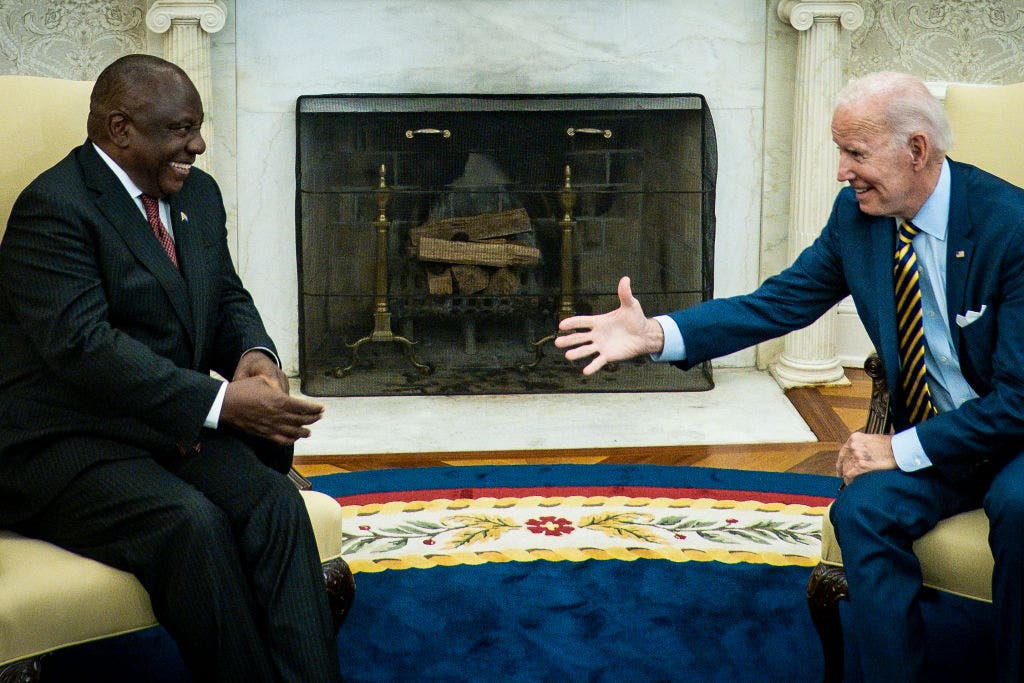
FIRST ON FOX – Iran, Russia and China are sweeping across Africa, with the U.S. facing a crisis of influence. In South Africa, the government has aligned itself with the “bad actors” Russia, China and Iran. These are the main takeaways from an exclusive interview with South Africa’s chief rabbi, Dr. Warren Goldstein.
Goldstein spoke with Fox News Digital in Johannesburg on Monday, on the eve of what promises to be a watershed presidential election in South Africa this week. Thirty years ago, the African National Congress (ANC) Party swept into power, carrying Nelson Mandela to become the country’s first democratic president. There have been remarkable achievements, but corruption, nepotism, failed government promises and catastrophic fraud-linked power blackouts have left democracy critically strained and many voters disillusioned. In Wednesday’s polls, for the first time, the ANC is likely to lose its majority.
Across Africa, as democracies become weaker, countries which are strange bedfellows step out of the murky shadows. “The bad actors in international politics, China, Russia and Iran, are making a grab for the African continent,” Goldstein told Fox News Digital.
Goldstein added “also realize that the African continent is suffering from a wave of jihadi terror in which Christians are being persecuted across the continent. In this context, South Africa in particular, and the African continent in general, is a beacon and can be a very important ally for the United States in promoting freedom and democracy.”
GOP SENATORS BLAST BIDEN ADMIN MOVES IN AFRICA AS RUSSIA LOOKS TO FILL VACUUM
South Africa’s chief rabbi, Dr. Warren Goldstein. (Office of the Chief Rabbi )
“American values are at stake on the African continent, and we need a much stronger American presence in the continent as a whole and in South Africa in particular”, he continued.
Responding to the growing worry of U.S. foes gaining ground in South Africa and the region, a State Department spokesperson told Fox News Digital “we have a strong relationship with South Africa and that relationship is based on the priorities of the American people and the South African people, our shared values and our interests. We are committed to an affirmative agenda with South Africa, through which we work together to bring our nations’ respective priorities to the table.”
The spokesperson added “The United States believes all countries may choose the countries and groupings with which they associate. South Africa is a sovereign country that can make its own decisions about how to engage others. The relationship between the United States and South Africa is broad, deep, and multifaceted, grounded in values, interests, and people-to-people ties that include our common journeys to uphold human dignity. We’re focused on making our relationship even stronger, to the benefit of Americans and South Africans, and we aren’t distracted by what others are doing.”
Analysts have often accused the ANC of telling the South African government, in which, until Wednesday, its members have a majority, what to do and say. This, Goldstein told Fox News Digital, has led to the country turning away from the West. “A very important thing to understand is the distinction between the ANC government and the South African people. They are very divergent in their values,” said Goldstein.
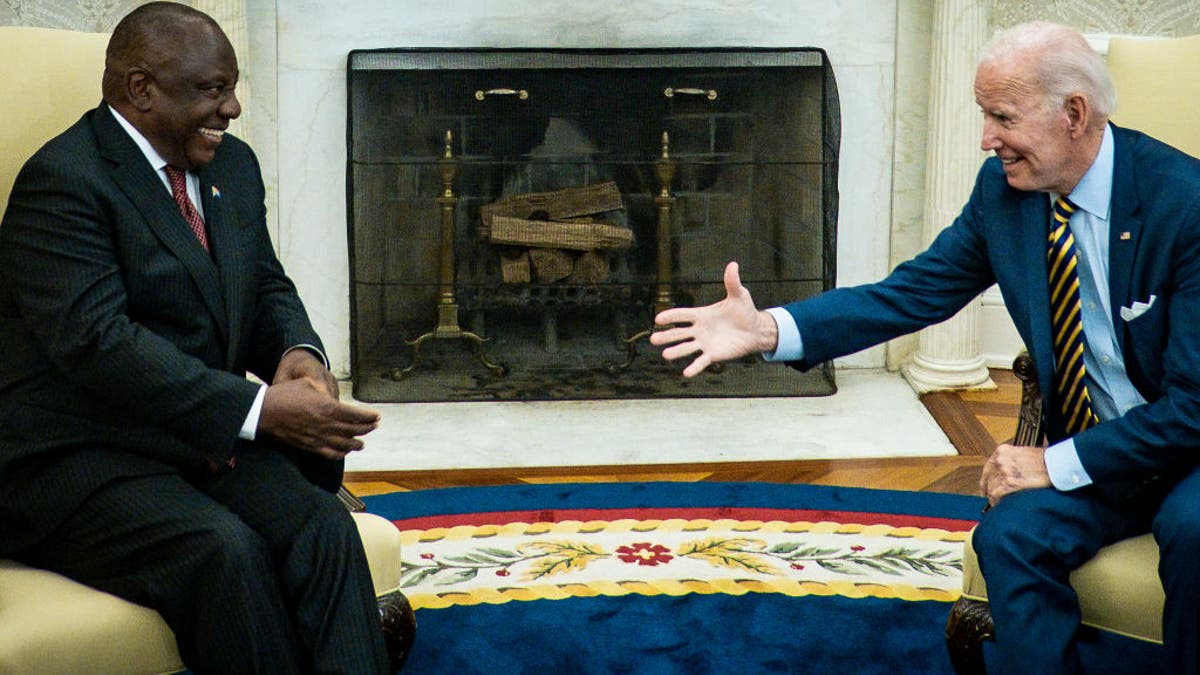
President Biden, right, shakes hands with South African President Cyril Ramaphosa during a bilateral meeting in the Oval Office of the White House on Sept. 16, 2022 in Washington, D.C. The two leaders reaffirmed the importance of enduring partnership, and discussed their work together to address regional and global challenges. (Photo by Pete Marovich-Pool/Getty Images)
“The ANC government has aligned itself with Russia, China and Iran. The South African people do not share their values in this regard. And to note that this is going to be the first time in South African history the ANC is going to drop below 50% (in electoral votes).”
“It has lost the support of the majority of South Africans. And therefore, when America is considering the opportunities for alliances with South Africa, with the continent, it needs to look beyond the ANC government. That it is a waning force in South African politics, and it is eventually on its way out”
CHRISTIANS IN AFRICA FACE WORRYING RISE IN KILLINGS, PERSECUTION AND DISPLACEMENT
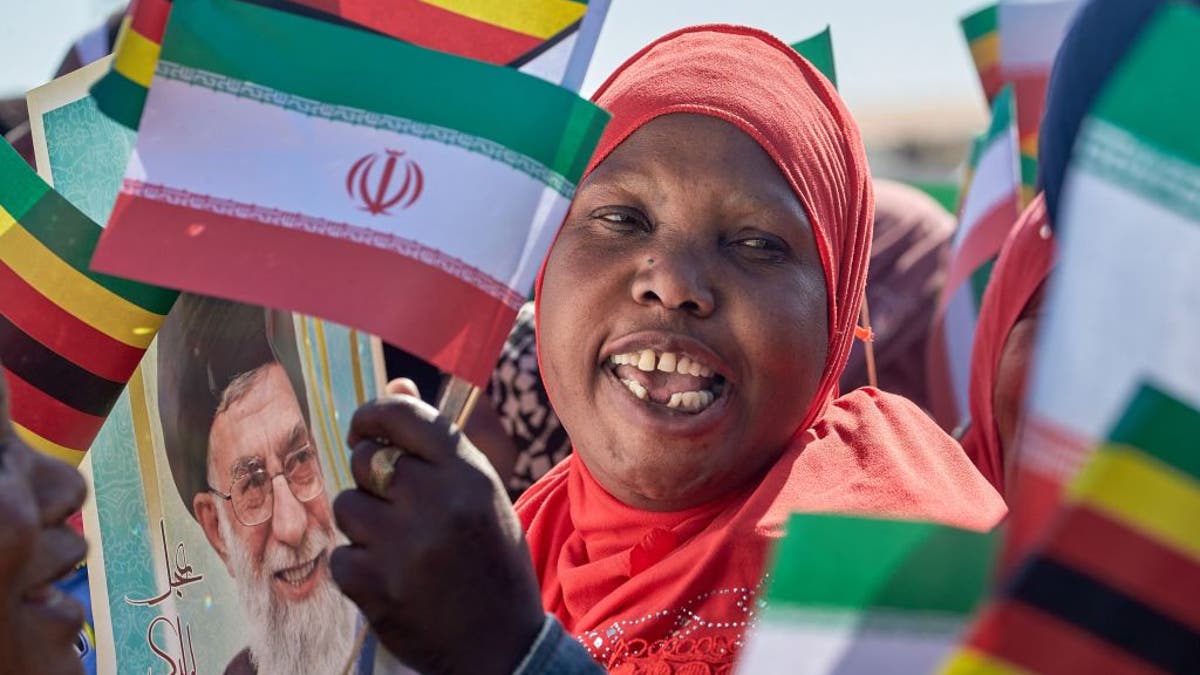
A woman holds up a poster of Iranian President Ebrahim Raisi (not seen) as they welcome him upon arrival for a state visit at the Robert Gabriel Mugabe International Airport in Harare on July 13, 2023. (Jekesai Nijikizana/AFP via Getty Images)
The South African government responded to Goldstein’s criticism, noting, “Firstly, it’s wrong to label the South African government with a political party,” Clayson Monyela, head of public diplomacy at South Africa’s Department of International Relations, told Fox News Digital.
“Decisions of the state are taken by the state and not the ruling party,” Monyela added. “The values that this government espouses are shared by the people it represents. The constitution of the Republic is the guide.”
However, the official opposition, the Democratic Alliance (DA), believes the ANC pushes its cadres into influential government positions. On their own website, the ANC calls the positioning of their faithful ‘cadre deployment,” as if such a procedure was part of a military exercise.
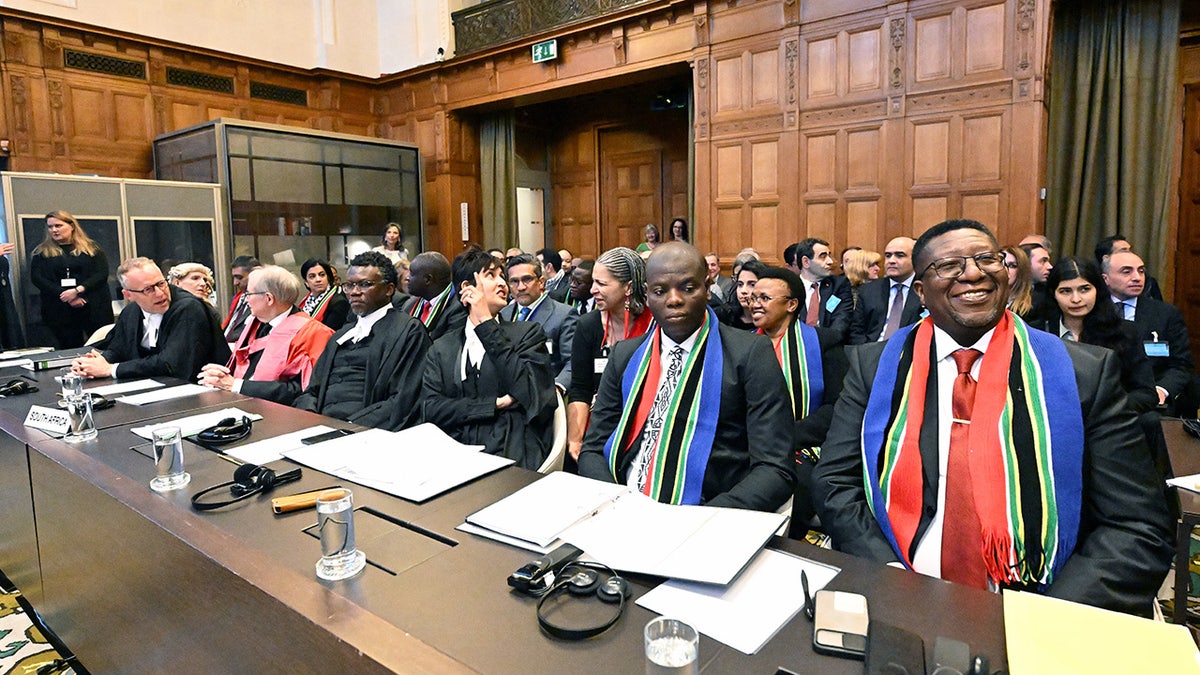
Public hearings in South Africa’s genocide case against Israel begin at the International Court of Justice in The Hague, Netherlands, on Jan. 11, 2024. (Dursun Aydemir/Anadolu via Getty Images)
In a document accompanying a court action in February, the DA stated “The ANC controls both the demand-side and the supply-side of senior administrative roles, State-owned enterprises (SOEs), boards, entities, and independent state institutions.”
This past Friday, the International Court of Justice (ICJ), the world’s top court, voted that Israel should “immediately halt its military offensive in Rafah.” South Africa had applied to the court to stop the attack in Gaza.
Rabbi Goldstein said, “The ICJ ruling is not only an attack on Israel’s right to self-defense, it is also a threat to the United States of America and all countries of the free world. – when you can have, for example, a judge from Lebanon presiding over this matter, and countries representing, if you think about the United Nations, the vast majority of the members of United Nations do not come from free democracies. You cannot have dictatorships and their representatives determining when free democracies can defend themselves against the forces of terrorism and violence in the world.”
ANGER RISES OVER SOUTH AFRICA MAKING MILLIONS IN US BENEFITS WHILE COZYING UP TO IRAN, RUSSIA AND HAMAS
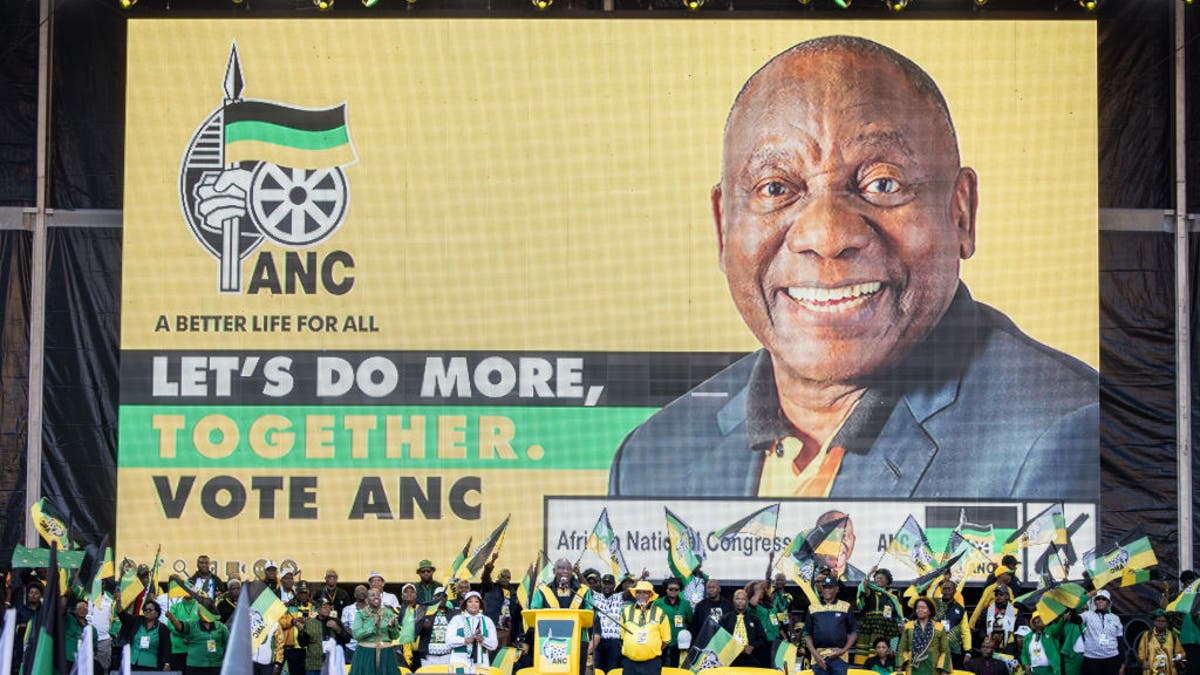
President of the ruling African National Congress (ANC) and South African President Cyril Ramaphosa speaks to supporters during the ANC Siyanqoba Rally held at FNB Stadium on May 25, 2024 in Johannesburg. South Africa’s national and provincial elections will be held on May 29, 2024 to elect a new National Assembly and provincial legislature in each of the nine provinces. (Photo by Chris McGrath/Getty Images)
Monyela defended the country’s actions, saying “The SA government’s principled position on the Palestine/Israeli matter has been vindicated repeatedly by the rulings of the ICJ. We approached the ICJ to stop the current genocidal acts being perpetrated by Israel against the people of Palestine. This is what all peace-loving people of the world, who believe in human rights and international law, should do.”
South Africa kicked out Israel’s ambassador and closed the embassy, but Goldstein told Fox News Digital that there is little antisemitism among ordinary South Africans. “Antisemitism in South Africa today is a fascinating paradox, which is very revealing about what is actually happening in this country. On the one hand, you have the South African government that has been the most anti-Israel, pro-Hamas, pro-Iranian government in the world when considering free democracies, which is a betrayal of the South African constitution and the values of this country.”
US CONCERNED OVER SOUTH AFRICA’S GROWING TIES WITH RUSSIA, IRAN AND HAMAS: ‘FALLEN’ FOR PROPAGANDA
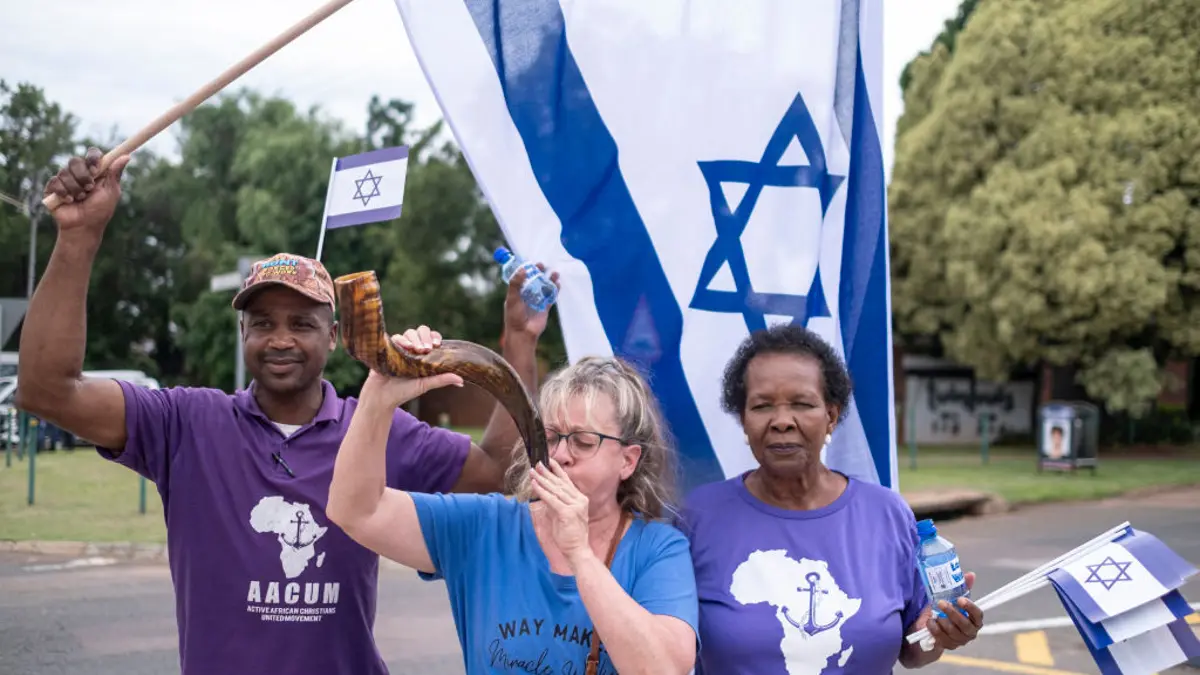
Members of the Active African Christians United Movement pose as one of them blows through a shofar as others gather in support of Israel outside the embassy of Israel in Pretoria on Nov. 17, 2023. (Photo by EMMANUEL CROSET/AFP via Getty Images)
Goldstein continued” On the other hand, the South African Jewish community has experienced amongst the lowest levels of antisemitism of any Jewish community in the world. And so you have this paradox, an assault, an ANC government that has been pro-Iran, and a South African people that is welcoming of its fellow citizens of the Jewish faith together with all of the citizens of this country, this tremendous spirit of togetherness of unity and diversity, which is the motto of the country, really drawing from the spirit of Nelson Mandela, which is still felt to this day, which is utterly at odds with the spirit and the values of the ANC government.”
Monyela hit back, adding, “The challenge with this comment is the deliberate blurring of the lines between the ANC and the state. The South African Government is not anti-Israel and most certainly not pro-Hamas.”
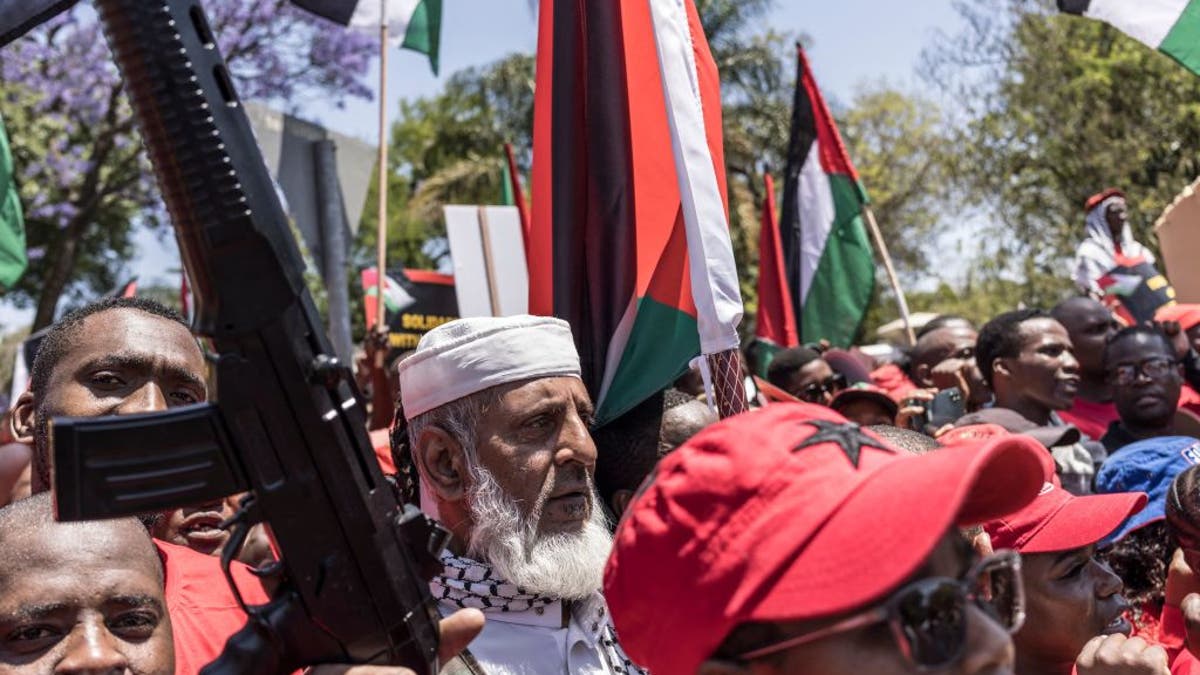
A man brandishes a replica toy gun during a pro-Palestinian demonstration organized by the South African opposition party Economic Freedom Fighters in front of the Israeli Embassy in Pretoria on Oct. 23, 2023. (Marco Longari/AFP via Getty Images)
“It is the most ridiculous and outrageous thing to suggest”, added Monyela. “These false and manufactured narratives, including the baseless antisemitism label, are a blunt object meant to silence us from speaking out against the genocidal acts of Israel against the Palestinian people.” He claimed that “The ICJ has repeatedly agreed with us. Look at the comments of the President of France on the latest attacks in Rafah that killed innocent civilians. Even the White House has criticized Israel. The Israeli Prime Minister himself has called for an investigation. South Africa is consistent in calling for the respect of human rights and international law. Our position on the two-state solution is on record.”
Fox News Digital reached out to the ANC for comment, but received no response.
World
NATO has upped vigilance amid suspected Russian sabotage – Stoltenberg
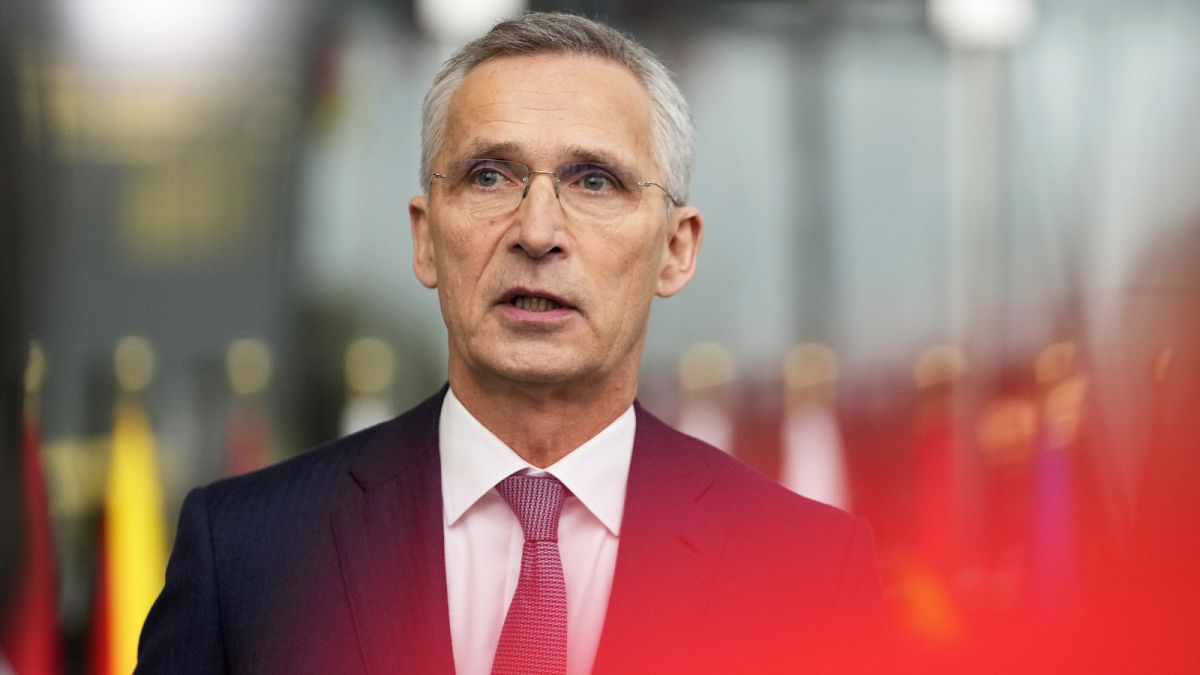
A string of recent suspected sabotage operations across allied countries has the military alliance on the alert.
NATO has upped its “vigilance” amid an increase in “Russian intelligence activity” across its member countries, the military alliance’s secretary-general acknowledged on Tuesday
Asked about recent suspected Russian sabotage and arson attempts targeted at warehouses, shopping centres and households across EU and NATO countries, Stoltenberg refrained from directly pinning responsibility on the Kremlin.
But he clearly indicated the alliance was monitoring the events and underlined the importance of criminal investigations at national level.
“We have seen increased Russian intelligence activity across the alliance, therefore we have increased our vigilance, we have our own services who are closely monitoring what the Russians are doing,” Stoltenberg – who is due to step down in October after a decade at NATO’s helm – said.
“It is important that also nations are taking action (with) the arrests and the legal processes that have now started in the UK, in Germany, in Poland and in other countries,” he added.
“We need to be ready and we need to share intelligence (…) to counter these different types of hybrid acts aimed at undermining the ability of NATO allies to provide support to Ukraine.”
Russian attempts to ‘intimidate’
Over the weekend, a New York Times report citing US and allied security officials claimed some of the recent hybrid attacks – notably attempted arson – in Europe were the work of the GRU, Moscow’s military intelligence arm.
The incidents include recent arson attempts on sites across Poland which led to nine individuals being arrested on suspicion of Russian sabotage last Tuesday.
Speaking to Polish broadcaster TVN24 last week, Polish Prime Minister Donald Tusk said the suspects – allegedly Ukrainian, Belarusian, and Polish citizens – had “engaged directly on behalf of the Russian services in acts of sabotage in Poland,” including physical assault, arson and attempted arson.
Tusk said the attacks included an attempt to set fire to a paint factory in the western Polish city of Wroclaw, as well as other recent incidents in Lithuania, Latvia, and potentially Sweden.
A recent arson at an Ikea warehouse in Lithuania is now suspected of being linked to the Kremlin’s operations.
Speaking to local media last Wednesday, Latvian Prime Minister Evika Siliņa also warned of possible Russian operations in the country, noting that “arson is one of the most typical forms of diversion for Russian special services.”
In April, two German-Russian nationals were arrested in Germany for planning bombings and arson attacks against critical infrastructure and military bases.
Authorities in the United Kingdom, a non-EU member state but a NATO ally, also arrested two men in late April after an arson attempt on a Ukraine-linked business on an industrial estate in east London.
Speaking ahead of a meeting of EU defence ministers in Brussels on Tuesday, the Netherlands’ defence minister Kajsa Ollongren also raised the alarm: “What we’re seeing now in several European countries is Russia trying to destabilise us, also to intimidate us.”
“We are aware of this new way of working,” she added. “And, so, yes, we are vulnerable. I think all of us are. We have vital infrastructure, we have undersea bed infrastructure, we have electricity supplies, water supplies (…) We are vulnerable but we can also protect ourselves if we cooperate between partners, with industry, and with our security services,” she added.
The bloc’s top diplomat Josep Borrell said there was no evidence yet to incriminate Russia for such attacks.
-

 Movie Reviews1 week ago
Movie Reviews1 week ago‘The Substance’ Review: An Excellent Demi Moore Helps Sustain Coralie Fargeat’s Stylish but Redundant Body Horror
-

 Movie Reviews1 week ago
Movie Reviews1 week ago‘Rumours’ Review: Cate Blanchett and Alicia Vikander Play Clueless World Leaders in Guy Maddin’s Very Funny, Truly Silly Dark Comedy
-

 News1 week ago
News1 week agoVideo: A Student Protester Facing Disciplinary Action Has ‘No Regrets’
-

 Movie Reviews1 week ago
Movie Reviews1 week ago‘Blue Sun Palace’ Review: An Intimate, Affecting and Dogma-Free Portrait of Chinese Immigrants in Working-Class New York
-

 Culture1 week ago
Culture1 week agoFrom Dairy Daddies to Trash Pandas: How branding creates fans for lower-league baseball teams
-

 World1 week ago
World1 week agoPanic in Bishkek: Why were Pakistani students attacked in Kyrgyzstan?
-

 World1 week ago
World1 week agoRussian court seizes two European banks’ assets amid Western sanctions
-

 Politics1 week ago
Politics1 week agoAnti-Israel agitators interrupt Blinken Senate testimony, hauled out by Capitol police








